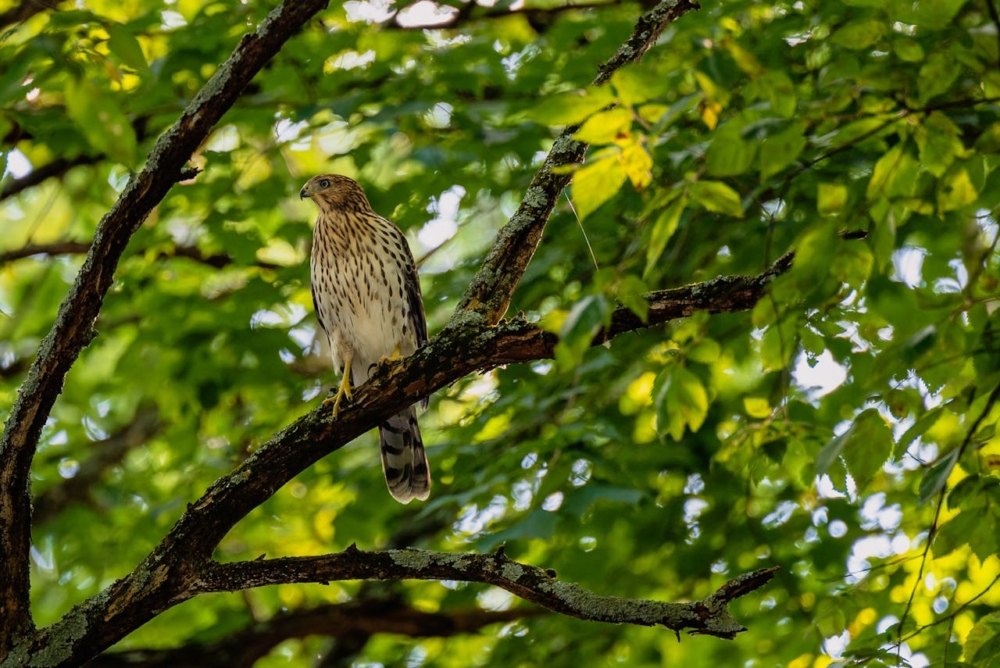Hawks have moved into our neighborhood.
Our house is set next to a 45-acre municipal park, a lovely, wild, undomesticated woods. It has sharp ravines and drop-offs, all heavily wooded, lovely to view but difficult to navigate. At least for humans. Wildlife abounds that wanders through our yard—turkeys, deer, fox, coyote, martins, racoons, squirrels, rabbits, and an amazing multitude of birds. They have no difficulty with the terrain; in fact, they thrive in it. The ravines are tree-clogged and steep. They seem designed specifically to keep humans out. Occasionally, hikers from the park emerge into our yard, apologetic for losing their way. We love it here, and it is one of the primary reasons we chose to purchase this property.
Hawks and owls are not unknown to us. Both appear regularly. The owls mostly at night when we hear their calls after dark. Sometimes we keep our windows cracked at night just to hear them. Hawks more occasionally, appearing high in the sky, riding thermals in wide circles. We are near the Minnesota and Mississippi Rivers, so bald eagles come through as well. But this is different. The Cooper Hawks seem to have moved in to stay.
At least we hope so.
For one thing, Cooper Hawks hunt and eat squirrels, a good in the cosmic scheme of things. Squirrels are rats with furry tails, and without the fur would be recognized for the vermin they are. Rodents destructive to electric lines, siding, songbird nests, fledgling birds, and bird feeders. It’s difficult to identify any way to commend them. Except that a good God created them. Which is enough, I suppose, not to hate or exterminate squirrels, but to be glad Cooper Hawks like to eat them. May the Cooper hawks flourish, world without end, Amen.
They are stately birds, standing upright and straight on branches, gazing out across their curved beaks. The beaks look cruel, truth be told, like their talons, sharp, hooked, and predatory. I wouldn’t want to be a squirrel.
As I write this, I can hear one of the hawks calling in the woods. We suspect it’s a juvenile, but don’t know for certain. I can’t imagine a predator would want to advertise its presence so loudly.
In Holy Scripture, hawks are included in the list of unclean creatures the Israelites were forbidden to eat (Leviticus 11:16; Deuteronomy 14:15). As predators and scavengers that is not surprising. God also points to them to highlight the wisdom embedded in his creation. “‘Is it by your wisdom that the hawk soars,’ God asks Job, ‘and spreads its wings towards the south?’” In mythology, hawks are seen to represent clear vision, perspective from on high, an ability to see beyond the mere here and now.
To us, the pair of Cooper’s Hawks that have moved in are our neighbors. Creatures created by God for a purpose and determined by him, good. We will watch them and try to learn from them. And we will be careful, watchful when Margie lets her three beloved hens out of the coop to forage in the yard. More than likely, they look tasty from on high.
I accept that the fallenness of the world means some creatures must tear, attack, kill, and eat other creatures if they are to live. Sad, but that is the nature of fallenness. Young in the nest require nutrition. But this is also a reminder that all is not right. Something is broken, and badly broken at that. The ancient Hebrew prophet Isaiah could catch a glimpse of the world when all is set right:
The wolf shall live with the lamb,
the leopard shall lie down with the kid,
the calf and the lion and the fatling together,
and a little child shall lead them.
The cow and the bear shall graze,
their young shall lie down together;
and the lion shall eat straw like the ox.
The nursing child shall play over the hole of the asp,
and the weaned child shall put its hand on the adder’s den.
They will not hurt or destroy
on all my holy mountain;
for the earth will be full of the knowledge of the Lord
as the waters cover the sea. [Isaiah 11:6-9]
I hope I can visit this little slice of the New Creation to see what it is like. As it should be. It may even give me a renewed perspective on squirrels. Though I doubt it.
Photo credit: Photo by Chris F on Pexels.com.



